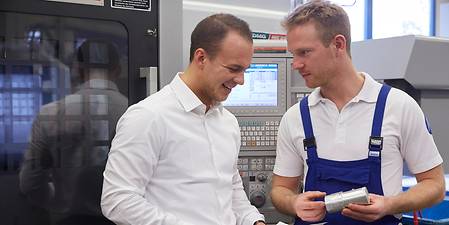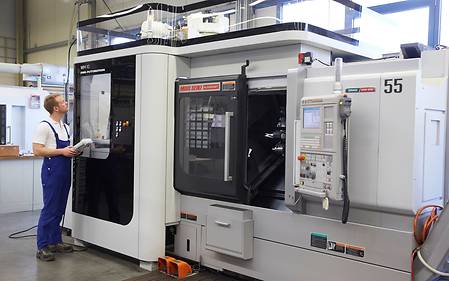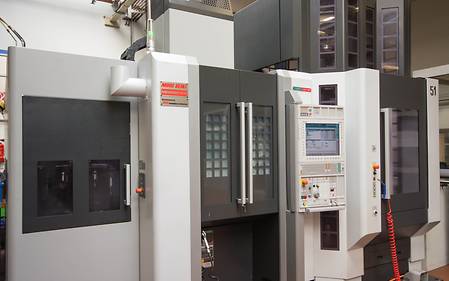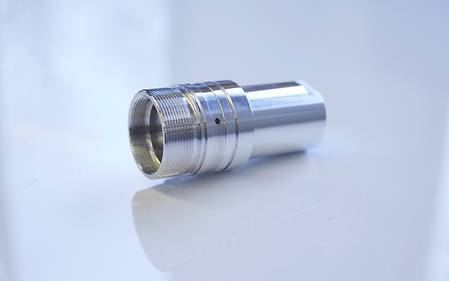Machining without limit
Maske produces sophisticated body implants for the medical industry with expertise and state-of-the-art CNC technology from DMG MORI
Since 1967, the Karl-Heinz Maske & Söhne GmbH has stood for top quality in metal processing. The toll manufacturer from Bönningstedt by Hamburg supplies customers from growth branches such as the medical and aerospace industries as well as the mechanical engineering branch with sophisticated components that demand the entire expertise of its around 90 employees. Its range of services also includes support during the development phase. Where actual production is concerned Maske has been working together with DMG MORI for many years now and continuously expands its machine park to increase capacities and keep abreast of the latest state-of-the-art technology. Maske’s most recent investments include an NLX 2500 with WH 10 top handling.
“We have always realised every order – no matter how sophisticated or complex the workpiece.” Michael Maske, Managing Director of the company that bears his name, sees this achievement as the result of the company’s many years of experience and the high demands it places on quality. The latter is a key criterion in the target branches that Maske supplies as a toll manufacturer. The best example here is medical engineering, where Maske generates the greater part of its revenues. The wide range of parts in this division includes both implants and components for X-ray equipment. “The demands on precision and complexity are enormous here”, says Michael Maske. We also machine virtually all types of material – from stainless steel to aluminium and on to include titanium and special alloys.
Its high level of quality is Maske’s trademark and at the same time necessary for its continued success, because the toll manufacturer offers its customers a full service with high degree of vertical integration. In other words: It can handle all standard machining processes and its team of specialists is well-qualified to take up every challenge. To ensure this competence remains so high and because it is difficult to find good skilled workers, the company trains its own people. Such training is extremely practice-orientated explains Maik Maske, son of the Managing Director Michael Maske: “Our young trainees are integrated in the production at a very early stage, so they know our products and procedures inside out when they have finished their training.”
More efficient production with modern CNC technology
Another reason for the success of Maske is the modern equipment it uses in production. The company has relied on CNC machines from DMG MORI for over 20 years now. Maske regularly purchases new machines in order to expand it capacities or to replace older models with more modern ones. “As a rule changing over to more modern machine tools also goes hand-in-hand with an expansion in capacity, because increased performance or more efficient processes ensure a significantly higher throughput”, explains Michael Maske.
There are currently over 50 machines from DMG MORI in operation at Maske, including NL and NLX lathes as well as numerous 5-axis vertical machining centres from the NMV series. There is even an NH 10000 DCG available for large components weighing up to two tons. The Managing Director explains the company’s loyalty to the machine supplier with the high quality of the machines: “They are reliable, maintenance-free and produce with consistent precision - all vital criteria for us.” In addition, the Service team offers fast and competent support, so the consequences of any potential standstills are negligible.
The NMV 5-axis vertical machining centres are of great importance in the medical engineering division. There are in total five NMV 5000 DCG machines and another five NMV 3000 DCG machines involved here. One of the key arguments in favour of this series, explains Maske, is the high precision of the machines: “The rigid construction is the decisive factor here.” The great diversity of the NMV machines was also a decisive criterion. “Five-axis machining combined with the enormous swivel range leaves us every freedom in the machining of demanding free-from surfaces”, adds the founder of the company. One very good example in this respect are the knee implants that Maske produces in eight different sizes.
Maske also uses pallet systems to enable even more productivity. “The NMV 3000 DCG machines are equipped with 34 pallets, which ensures maximum flexibility in production”, says Maik Maske about the equipment of the machining centres. In view of the small batch sizes and prototype production, such flexibility is vital if the company is to maintain its competitive edge. This is also true of its latest purchase, an NLX 2500 with WH 10 top handling. DMG MORI Systems designed the handling system for workpieces weighing up to 12 kg, so it is ideally suited for the range of parts at Maske. Unmanned production of small to large batches also keeps the company a step ahead of the competition. “The automated NLX 2500 operates so economically that we can take on orders that would otherwise be placed with foreign suppliers”, explains Maik Maske. “As we produce extremely complex, high-quality parts, the hallmark made in Germany remains an important factor for many customers.”
Its consistent use of machines from DMG MORI together with the uniformity of the controls provide the added advantage for Maske that employees can be allocated flexibly to work on different machines. “The fact that the MAPPS control is the same for all machines and ESPRIT is always used for programming adds up to a high level of user comfort”, says Michael Maske.
The development that has taken place over the years is a clear indication that Maske follows a growth strategy. The number of employees has grown from 17 in the year 2000 to stand at 90 today. The production area, too, has been expanded to an impressive 3,000 square meters. And the additions to the machine park speak for themselves. Even the times of crisis in recent years had no impact on the company, as its satisfied customers all come from future-orientated growth branches. Michael Maske knows from experience: “Customers appreciate our quality awareness, our commitment and our short response times.”



